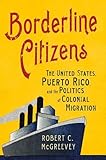Borderline Citizens : The United States, Puerto Rico, and the Politics of Colonial Migration / Robert C. McGreevey.
Material type: TextSeries: The United States in the WorldPublisher: Ithaca, NY : Cornell University Press, [2018]Copyright date: ©2018Description: 1 online resource (264 p.) : 9 b&w halftones, 1 mapContent type:
TextSeries: The United States in the WorldPublisher: Ithaca, NY : Cornell University Press, [2018]Copyright date: ©2018Description: 1 online resource (264 p.) : 9 b&w halftones, 1 mapContent type: - 9781501716164
- Citizenship -- United States -- History -- 20th century
- Puerto Ricans -- Migrations -- History -- 20th century
- Puerto Ricans -- United States -- History -- 20th century
- Latin American & Caribbean Studies
- Political Science & Political History
- U.S. History
- HISTORY / United States / 20th Century
- interaction of legal categories, changing political economies, demands of migrants, imperial approach to the history of migration, changing colonial legal categories, the nature of U.S. empire and citizenship
- 305.8687295 23
- E184.P85 M38 2019
- online - DeGruyter
| Item type | Current library | Call number | URL | Status | Notes | Barcode | |
|---|---|---|---|---|---|---|---|
 eBook
eBook
|
Biblioteca "Angelicum" Pont. Univ. S.Tommaso d'Aquino Nuvola online | online - DeGruyter (Browse shelf(Opens below)) | Online access | Not for loan (Accesso limitato) | Accesso per gli utenti autorizzati / Access for authorized users | (dgr)9781501716164 |
Frontmatter -- Contents -- Acknowledgments -- Introduction: Migration and Empire -- Chapter 1. America’s Caribbean Frontier -- Chapter 2. The Rise of National Status -- Chapter 3. Labor Networks -- Chapter 4. Citizenship and Statelessness -- Chapter 5. “Working People Going North” -- Chapter 6. Colonial Migrants in New York -- Conclusion: U.S. Empire and the Boundaries of the Nation -- Notes -- Bibliography -- Index
restricted access online access with authorization star
http://purl.org/coar/access_right/c_16ec
Borderline Citizens explores the intersection of U.S. colonial power and Puerto Rican migration. Robert C. McGreevey examines a series of confrontations in the early decades of the twentieth century between colonial migrants seeking work and citizenship in the metropole and various groups—employers, colonial officials, court officers, and labor leaders—policing the borders of the U.S. economy and polity. Borderline Citizens deftly shows the dynamic and contested meaning of American citizenship.At a time when colonial officials sought to limit citizenship through the definition of Puerto Rico as a U.S. territory, Puerto Ricans tested the boundaries of colonial law when they migrated to California, Arizona, New York, and other states on the mainland. The conflicts and legal challenges created when Puerto Ricans migrated to the U.S. mainland thus serve, McGreevey argues, as essential, if overlooked, evidence crucial to understanding U.S. empire and citizenship.McGreevey demonstrates the value of an imperial approach to the history of migration. Drawing attention to the legal claims migrants made on the mainland, he highlights the agency of Puerto Rican migrants and the efficacy of their efforts to find an economic, political, and legal home in the United States. At the same time, Borderline Citizens demonstrates how colonial institutions shaped migration streams through a series of changing colonial legal categories that tracked alongside corporate and government demands for labor mobility. McGreevey describes a history shaped as much by the force of U.S. power overseas as by the claims of colonial migrants within the United States.
Mode of access: Internet via World Wide Web.
In English.
Description based on online resource; title from PDF title page (publisher's Web site, viewed 26. Apr 2024)


